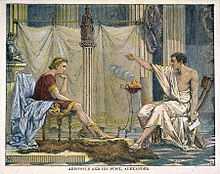342 BC
From Wikipedia, the free encyclopedia
| 342 BC by topic | |
| Politics | |
| State leaders – Sovereign states | |
| Birth and death categories | |
| Births – Deaths | |
| Establishments and disestablishments categories | |
| Establishments – Disestablishments | |
| Gregorian calendar | 342 BC |
| Ab urbe condita | 412 |
| Armenian calendar | N/A |
| Assyrian calendar | 4409 |
| Bahá'í calendar | −2185 – −2184 |
| Bengali calendar | −934 |
| Berber calendar | 609 |
| English Regnal year | N/A |
| Buddhist calendar | 203 |
| Burmese calendar | −979 |
| Byzantine calendar | 5167–5168 |
| Chinese calendar | 戊寅年 (Earth Tiger) 2355 or 2295 — to — 己卯年 (Earth Rabbit) 2356 or 2296 |
| Coptic calendar | −625 – −624 |
| Discordian calendar | 825 |
| Ethiopian calendar | −349 – −348 |
| Hebrew calendar | 3419–3420 |
| Hindu calendars | |
| - Vikram Samvat | −285 – −284 |
| - Shaka Samvat | N/A |
| - Kali Yuga | 2760–2761 |
| Holocene calendar | 9659 |
| Igbo calendar | −1341 – −1340 |
| Iranian calendar | 963 BP – 962 BP |
| Islamic calendar | 993 BH – 992 BH |
| Japanese calendar | N/A |
| Juche calendar | N/A |
| Julian calendar | N/A |
| Korean calendar | 1992 |
| Minguo calendar | 2253 before ROC 民前2253年 |
| Thai solar calendar | 202 |
| Wikimedia Commons has media related to 342 BC. |
Year 342 BC was a year of the pre-Julian Roman calendar. At the time it was known as the Year of the Consulship of Ahala and Rutilus (or, less frequently, year 412 Ab urbe condita). The denomination 342 BC for this year has been used since the early medieval period, when the Anno Domini calendar era became the prevalent method in Europe for naming years.
Events
By place
Macedonia
- The Greek philosopher, Aristotle, is invited by Philip II to his capital at Pella to tutor his son, Alexander. As the leading intellectual figure in Greece, Aristotle is commissioned to prepare Alexander for his future role as a military leader.
- Philip begins a series of campaigns in Thrace with the aim of annexing it to be a province of Macedonia. When the Macedonian army approaches Thracian Chersonese (the Gallipoli Peninsula), an Athenian general named Diopeithes ravages this district of Thrace, thus inciting Philip's rage for operating too near one of his towns in the Chersonese. Philip demands his recall. In response, the Athenian Assembly is convened. Demosthenes convinces the Athenians not to recall Diopeithes.
Sicily
- The Corinthian general Timoleon spreads his rule over Sicily, removing a number of other tyrants and preparing Sicily for another threatened Carthaginian invasion.
Roman Republic
- The Battle of Mount Gaurus is fought between the Romans and the Samnites. The battle is a success for the Romans, who, it is said, are led by Marcus Valerius Corvus. Fought at the foot of Mount Gaurus, near Cumae, it is the most notable engagement of the First Samnite War.
China
- In the course of the Warring States period, the army of the state of Qi defeats the army of the state of Wei in the Battle of Maling. This battle involves the military strategy of the general Sun Bin (descendent of Sun Tzu), and is the first battle in recorded history to give a reliable account of the handheld crossbow with trigger mechanism.
Births
Deaths
References
This article is issued from Wikipedia. The text is available under the Creative Commons Attribution/Share Alike; additional terms may apply for the media files.
